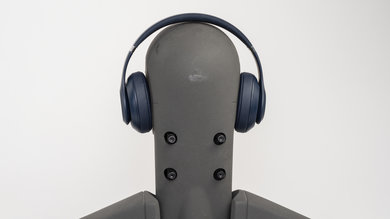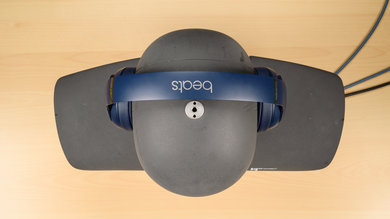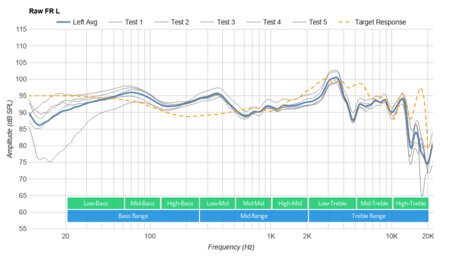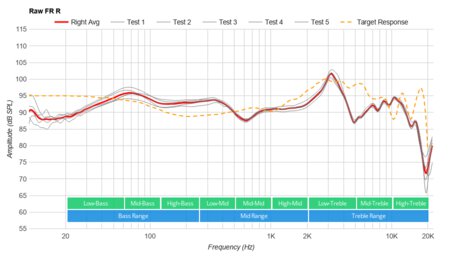The Beats Studio3 Wireless are over-ear headphones that come in various colorways. They have the same stylish and polished design as the previous Beats Studio Wireless but with an improved noise cancellation (ANC) system that automatically adapts to you and your environment. They also have a W1 chip for seamless pairing with your Apple devices.
Our Verdict
The Beats Studio3 are okay for neutral sound. Their warm sound profile delivers extra warmth and boom to mixes. However, the extra bass muddies tracks and the recessed treble hurts the detail of vocals and instruments. They're also prone to inconsistencies in bass delivery depending on their seal on your head and lack sound customization features to help you adjust their sound to suit your tastes, too.
- Comfortable and stable fit.
- Bass delivery varies significantly across users. Sensitive to glasses.
The Beats Studio3 are decent for commuting. These headphones are comfortable enough for long listening sessions, well-built, and come with a carrying case to help protect them when you're on the go. They also have noise cancelling but do a better job blocking out passenger chatter than the rumble of bus engines. On the upside, they last 23 hours continuously, making them a solid choice for long trips.
- Comfortable and stable fit.
- ANC has some trouble blocking out bass-range noise.
The Beats Studio3 are decent for sports. They're comfortable and stable enough to exercise with. They're also wireless with a great range, so you can leave your phone on a bench while you run or have a fixed Bluetooth source. However, they can make your ears a bit warm and sweaty throughout your workout. They also lack an IP rating for water resistance, though this is to be expected for over-ear headphones.
- Comfortable and stable fit.
- Bass delivery varies significantly across users. Sensitive to glasses.
The Beats Studio3 are satisfactory for office use. These comfortable over-ears are equipped with an ANC system to help cut down chatty coworkers and the high-pitched hum of AC units. With their ANC on, they also last around 23 hours continuously, so you don't need to recharge them often. Thanks to their low audio leakage, you can crank up your audio to high volumes without others around you hearing it. However, if you need to make calls, their integrated mic offers a sub-par performance, and it can be hard to hear you clearly if your office is noisy.
- Comfortable and stable fit.
- ANC can cut down mid to treble-range noise well.
- Bass delivery varies significantly across users. Sensitive to glasses.
- Sub-par overall mic performance.
The Beats Studio3 only connects wirelessly via Bluetooth and therefore aren't compatible with PlayStation or Xbox consoles. They're compatible with Bluetooth-enabled PCs, but their latency is a bit too high for gaming. That said, their latency is lower on iOS and Android devices, which is handy for mobile gaming.
The Beats Studio3 are satisfactory for wired gaming. They're comfortable for long gaming sessions thanks to their lightweight frame and padded ear cups. The sound profile also leans towards more bass, making effects like footsteps in FPS games easier to hear. However, their microphone offers a sub-par overall performance and only works on PC and PlayStation consoles. Xbox users can only receive audio, which is a little disappointing.
- Comfortable and stable fit.
- Mic doesn't work on Xbox consoles.
The Beats Studio3 are passable for phone calls. Their integrated mic has a just okay recording quality, so your voice sounds thin and lacks detail. Unfortunately, if you're taking calls in even moderately noisy environments like an office, the person on the other line may have difficulties hearing you too. On the upside, these headphones have an ANC system that can help block out some noise while on a call.
- ANC can cut down mid to treble-range noise well.
- Low audio leakage.
- Sub-par overall mic performance.
- ANC has some trouble blocking out bass-range noise.
Changelog
- Updated Aug 30, 2023: Added a note that the Beats Studio Pro Wireless offer the same app support for both iOS and Android.
- Updated Jun 14, 2023: We've updated the text of this review to maintain its accuracy. There hasn't been a change in our results, though.
- Updated May 11, 2022: Some users have experienced a clicking noise in the left ear cup after updating the headphones to firmware update 2.4.4. However, we didn't experience this issue with our unit, and the scoring of 'Noise Isolation' hasn't changed.
- Updated Oct 29, 2021: Updated review for accuracy and clarity.
Check Price
Differences Between Sizes And Variants
The Beats Studio3 come in four color variants: 'Matte Black', 'Blue', 'Red', and 'White'. They also come in a few special edition colors: 'A-COLD-WALL* Cement', 'Defiant Black-Red', 'Midnight Black', which have a tan inner headband with gold accents, and 'Shadow Grey', which have a beige inner headband and gold accents. Since these differences are only in color, we expect each to perform similarly to our unit. If you come across a pair that are different from ours, please let us know in the discussions, and we'll update our review.
Popular Headphones Comparisons
The Beats Studio3 are the updated version of the Beats Studio Wireless' design and are the manufacturer's only over-ear model. These premium cans have better isolation than their predecessor, thanks to their adaptive noise cancelling, and have a comfortable fit. However, their dynamic audio reproduction tends to sound inconsistent, and their noise isolation falls short compared to their competitors, like the Sony WH-1000XM4 Wireless.
See our recommendations for the best wireless Bluetooth headphones, the best over-ear headphones for working out, and the best closed-back headphones.
The Beats Solo 4 are from a newer generation than the Beats Studio3 Wireless and benefit from a few technological upgrades in the intervening years, such as USB-C audio, twice the battery life, and Apple Spatial Audio compatibility, to name a few. The Solo 4 also output a more consistent sound with a more balanced, slightly bright sound profile. On the other hand, the Studio3 Wireless fit over-ears (which some find more comfortable than the on-ear fit of the Solo 4), and they have a warmer tuning that's more akin to earlier Beats, which sounds muddier and duller than the Solo 4. The Studio3 Wireless are also the only pair with ANC, and although it's not super effective, it cuts low-pitched noises more than the Solo 4 isolates.
The Beats Studio3 Wireless are better headphones than the Beats Solo3 2019. The Studio3 are over-ear headphones that are more comfortable and have a good-performing ANC feature. However, the Solo3 2019 deliver audio more consistently and have a better battery performance. Some users may also prefer their bass-heavy sound profile.
The Beats Studio3 Wireless are somewhat better headphones than the Beats Studio Wireless. They have the same stylish and polished design, but the Studio3 have a better control scheme and improved noise cancellation. They sound quite similar, but the Studio3 sound slightly better overall. The Studio3 also have a much better battery than the Studio Wireless and feature the W1 chip for improved ease of use with Apple devices. The Studio have better latency and microphone noise handling performance. They’re both decent headphones for most uses, but the more intuitive pairing process and control scheme of the Studio3 gives them an edge.
The Sony WH-1000XM4 Wireless are better over-ear headphones than the Beats Studio3 Wireless. While both headphones are comfortable, the Sony are better built and their ANC does a significantly better job of cutting down ambient noise around you. They also have a longer-lasting continuous battery life, and their companion app offers a graphic EQ and presets to help adjust their sound to your liking. However, the Beats have a W1 chip, so you can seamlessly pair them with other Apple devices.
Test Results

The Beats Studio3, like many other headphones from Beats' lineup, including the Beats Solo3 2019 Wireless, have a sleek and rounded look. The manufacturer's logo is on each ear cup. They're available in several understated or flashy colors to suit your preferences, which is great if you want something that matches your style.
These over-ears are very comfortable. The ear cups are well-padded, and the pressure is distributed well around your ears. While the headband isn't as cushioned as the ear cups and can feel rigid, it isn't too much of an issue. You can wear them for long listening sessions without feeling too much fatigue.
The Beats Studio3 have decent controls that are better than their predecessor, the Beats Studio Wireless. The controls are efficient and easy to use. The buttons also provide good tactile feedback, but they're completely flat, so it may be a bit tricky to distinguish when you're first using them.
The 'b button':
- One press: Plays and pauses audio. Also answers and ends calls. You can answer a second incoming call when you're on a call. This command also lets you switch between calls.
- One press and hold: Activates voice assistant. Rejects an incoming call.
- Double press: Skips to the next track.
- Double press and hold on the second press: Scan forward through your track.
- Triple press: Skips to the previous track.
- Triple press and hold on the third press: Scan backward through your track.
The ring surrounding the 'b button':
- One press above the 'b button': Raises the volume.
- One press below the 'b button': Lowers the volume.
The power button:
- Press and hold for one second: Turns the headphones on and off.
- Double press (while connected to a device): Turns the ANC on and off.
These headphones have a somewhat breathable design, but they're closed-back over-ears with a decent seal, so they trap a lot of heat. While it's not so noticeable if you're only listening to audio at your desk, trapped heat can make you sweat while using the headphones during a long walk.
These headphones are somewhat portable. They fold into a more compact format that's easier to transport with the provided hard case. While they won't fit in a pocket, you can place them in most small bags. However, they're still bulky, so they take up room however you want to store them.
The Beats Studio3 are well-built headphones. Their ear cups are made from dense plastic that feels sturdy, while their headband has a tough yet flexible metal frame. They're a bit thinner and less robust than the wired Beats Executive, and the plastic coating on the headband is prone to scratches and scuffs, but their overall build quality feels high-end and well-made.

These cans have a warm sound profile. The bass is slightly boomy, good for bass-heavy genres like EDM and hip-hop. However, the added bass muddies the rest of the mix while the treble response is somewhat weak, resulting in veiled vocals and instruments and weak sibilants like cymbals. They're also prone to inconsistencies in audio delivery and lack an EQ or presets to help you customize their sound to your liking.

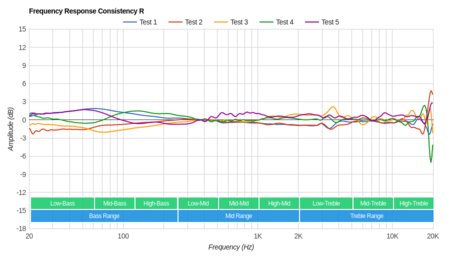
These over-ears have mediocre frequency response consistency. Despite their noise cancelling and self-calibrating systems, they perform less consistently than other noise cancelling headphones, like the Sony MDR-1000X Wireless and the Sony WH-1000XM2 Wireless. Their bass and treble delivery vary based on fit, seal, and positioning. It can also be difficult to achieve a consistent listening experience, especially if you have thick hair or wear glasses, as these features can disrupt the headphones' seal on your head.
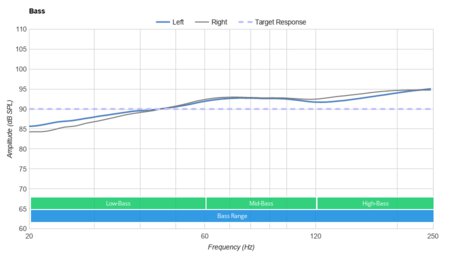
The bass accuracy is great. Although they lack a thumpy low-bass, the rest of the response is over-emphasized, which adds extra kick, warmth, and boom to your mixes. However, the extra high-bass makes mixes sound muddy. In songs like Satisfaction by Benny Benassi, the bassline has solid punch, which can sound energizing. However, it also bloats the rest of the mix.
Unfortunately, their bass delivery can vary noticeably across users: the quality of the fit, seal, and whether you wear glasses all affect how the bass sounds to you. Our response represents the average bass response, and your experience may vary.

These cans have very good mid accuracy. The low-mid is pretty overemphasized, which muddies and clutters the mix. However, the rest of the range is well-balanced. The mid-mid is fairly neutral, so vocals and lead instruments are present, but a small dip in the high-mid slightly weakens their detail and clarity.
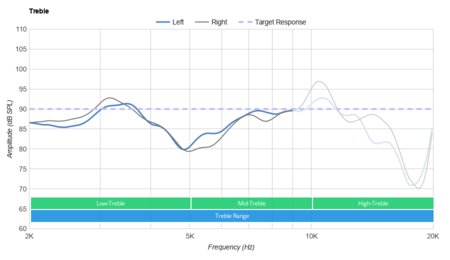
The treble accuracy is okay. The response is underemphasized, resulting in veiled vocals and lead instruments. Sibilants like cymbals are also dull and lispy.
These headphones are prone to inconsistencies in treble delivery and are sensitive to fit and positioning. Our results represent the average response, and your experience may vary.
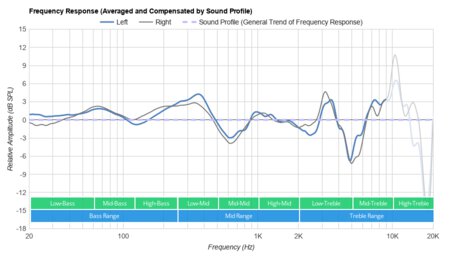
These headphones have a good peak and dips performance. There are a few deviations, but the headphones can follow their sound profile well overall. The peaks in the low to mid-bass and high bass to low-mid give a bit more kick and boom to your audio but also muddies the mix. A dip in the mid-mid nudges vocals and lead instruments to the back of the mix. The low-treble is also uneven, so the upper harmonics of vocals and lead instruments are alternatingly harsh and veiled. Sibilants like S and T sounds also sound a bit piercing.
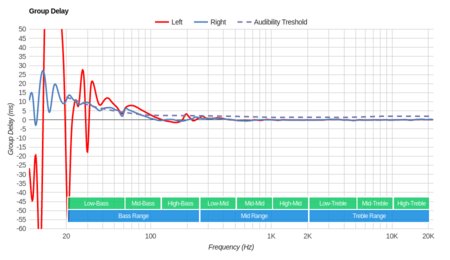
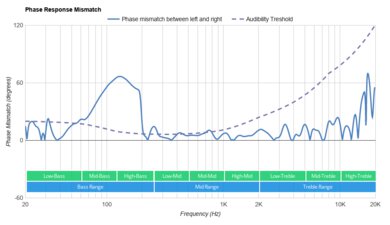
The Beats Studio3's stereo imaging is disappointing. Beats usually ensure good quality control and ergonomics. However, since imaging varies across units, it's possible to encounter a product with mismatched drivers. Our unit's L/R drivers have a few spikes in the group delay's bass range, which indicates a loose bass. The rest of the response falls below the audibility threshold, resulting in more transparent imaging. While the drivers are matched regarding amplitude, they're very mismatched in frequency and phase response. The right driver is louder in the bass range than the left and is noticeable in bass-heavy songs.

The passive soundstage performance is poor. Even though these are over-ear headphones, they don't activate the outer ear with resonances, resulting in a small soundstage that seems to be coming from inside your head. Their closed-back design makes their soundstage seem less spacious, especially compared to open-back models.
These headphones support Apple's Spatial Audio, a feature that creates a more immersive audio experience. However, unlike the Apple AirPods (1st generation) Truly Wireless, you can't access this feature directly through your phone's volume settings. Spatial Audio is only available in supported apps with compatible content, like Apple Music, and using many of these services requires a subscription or additional fee.
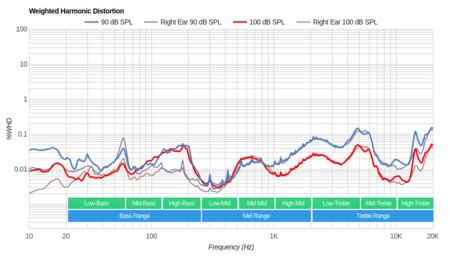
The weighted harmonic distortion performance is decent. The response generally falls within good limits at moderate listening volumes, resulting in clear and pure audio reproduction. However, there's a peak in the low to mid-treble at higher volumes. It's hard to hear with real-life content, though.
These are the settings used to test the Beats Studio3. Our results are only valid when used in this configuration.
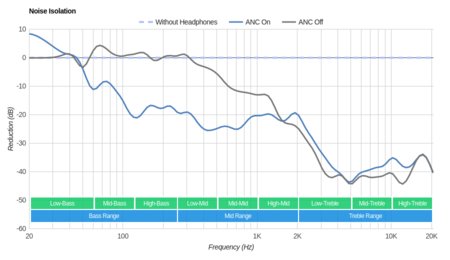
The Beats Studio3 have a decent noise isolation performance. However, they don't perform as well as competing models like the Sony WH-1000XM3 Wireless, Bose QuietComfort 35 II/QC35 II Wireless 2018, or the Microsoft Surface Wireless Headphones. While they barely reduce bass-range noise like bus or plane engines in the bass range, they do a better job of cutting down mid-range sounds like ambient chatter. They also do an outstanding job at blocking high-pitched noise like the hum of an AC unit. However, they produce a lot of self-noise with the ANC on, which can be distracting if there's no audio playing.
There have been a few user reports that after updating the headphones to firmware update 2.4.4, the headphones make a clicking noise in the left ear cup while in idle mode (power on and ANC on, but no audio playing). After updating our headphones to this firmware, we didn't hear any clicking sounds, regardless of whether audio was playing. However, if you've experienced this issue, please let us know in the discussions.
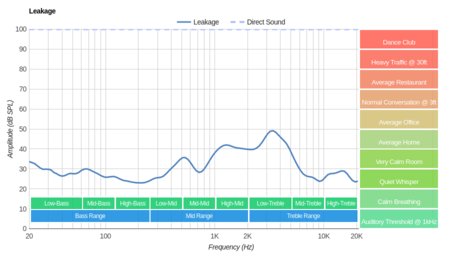
The leakage performance is great. Most leakage is found in the high-mid to mid-treble range, which sounds thin. In a noisy environment, people won't hear your audio if you have it cranked to a high volume.
These headphones have an integrated microphone. If you prefer to use these headphones wired, the cable also has an in-line microphone.

The integrated mic has a just okay recording quality. Your voice sounds slightly thin and lacking in detail and presence. There's also a bit of distortion present.
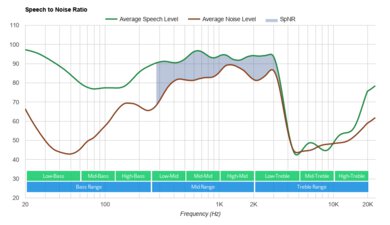
The microphone has disappointing noise handling. It struggles to separate your voice from ambient noise, even in moderately loud environments. As a result, if you're taking a call from a busy street, your voice will be drowned out.
The battery performance is good, and it's much better than that of the Beats Studio Wireless. At 23 hours of continuous playback on a single charge, they have almost twice the battery life. Battery life varies depending on use, though. They also only take about 30 minutes more to fully charge than the previous model. They also have a quick charge feature to give you about 2.5 hours of playback from 10 minutes of charging. Unfortunately, they don't have passive playback, so if the battery is completely dead, you can't use the headphones, even if you're using the analog cable.
The Beats app is disappointing. Like the Beats Solo3 2019 Wireless and the Apple AirPods (1st generation) Truly Wireless, the app has a few features available on iOS that aren't as well-implemented on Android. On iOS, they connect with a pop-up that displays basic battery information. You can also disable the ANC in the Bluetooth settings. However, this setting isn't available on Android, which is disappointing. However, you can always manually switch off noise cancelling by pressing the power button twice. If you're an Android user, the more recent Beats Studio Pro Wireless offer the same in-app features for Android and iOS.
The Beats Studio3 have decent Bluetooth compatibility. While they don't support multi-device or NFC pairing, they have a W1 chip for seamless pairing with other devices on your Apple device. They also have low latency on iOS and Android devices, which is nice if you stream video. However, their PC latency is much higher, which may cause audio and video syncing issues. That said, some apps and devices compensate for latency differently.
These headphones have a detachable 1/8" TRRS cable with an in-line remote microphone. However, you still need battery life left to use the analog cable. They also come with a micro-USB to USB-A cable for recharging the headphones.
The Beats Studio 3 are fully compatible with Bluetooth-enabled PCs when used wirelessly. You can also use their 1/8" TRRS cable to connect to PCs via their AUX port with full mic and audio compatibility. However, there needs to be battery life remaining to use the analog cable.
When connected via analog to the controller's AUX port, these headphones have full mic and audio compatibility on PlayStation consoles. The headphones don't support passive playback, so you'll need battery life remaining to use them wired.
These Bluetooth-only headphones aren't compatible with the Xbox One or Xbox Series X|S. However, if you use the provided audio cable, you can plug them into your controller for audio. However, the microphone won't work on these consoles. Additionally, since you can't use the headphones passively, there needs to be battery life remaining to use them via analog.












